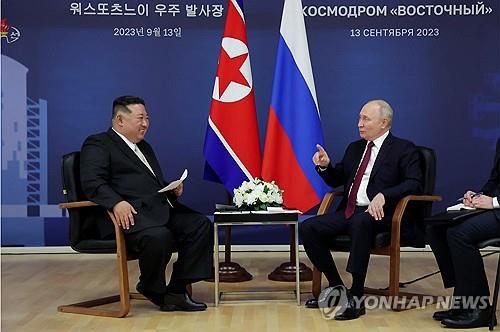By Song Sang-ho
WASHINGTON, July 26 (Yonhap) — A U.S. expert has called for Washington to request foreign countries drive North Korean workers out to prevent their companies, government agencies and others from facing “secondary sanctions,” amid concerns that Pyongyang has used the workers to secure hard currency to fund its weapons programs.
Bruce Klingner, senior research fellow for Northeast Asia at the Heritage Foundation, made the call in an article posted on The National Interest on Wednesday, noting that Pyongyang has sent its workers abroad in violation of a U.N. Security Council (UNSC) resolution.
Adopted in 2017, UNSC Resolution 2397 calls for all U.N. member states to repatriate any North Koreans earning income in their jurisdiction by the end of 2019.
“The U.S. should target North Korean overseas workers by requesting countries eject North Korean workers lest they face secondary sanctions against their companies, government agencies, or financial institutions,” Klingner said in the article.
Secondary sanctions are issued against third parties that are doing business with those subject to primary sanctions. They are meant to strengthen the effect of primary sanctions.
He noted that during their summit last month, Russian President Vladimir Putin and North Korean leader Kim Jong-un agreed to bolster bilateral trade, which he said could lead to an increase in the “already extensive” numbers of North Korean workers in Russia.
“These workers, along with those sent to China and other countries, work in violation of U.N. resolutions,” he said. “They allow the Kim regime to evade international sanctions by earning foreign currency for its prohibited nuclear and missile programs.”
The expert said that despite the UNSC resolution in point, more than 100,000 North Korean laborers continue to work in 40 countries, though predominantly in China and Russia, and that they generate an estimated annual revenue of US$500 million for Pyongyang.
He also pointed out that the workers work in “highly abusive” conditions and in violation of international labor laws.
“The workers usually receive only 10 percent to 30 percent of their salary, with the rest provided directly to the North Korean government,” he said. “Workers have to relinquish their passports and often work between 14 and 16 hours a day, with no holidays, except perhaps for one day a month. They can suffer confinement, beatings, and sexual exploitation.”
Klingner called on Washington to “take the lead” in working with foreign governments to curb the North’s use of illicit means to “finance its growing military threat to the region and to the American homeland.”
This file image, captured from North Korea’s state-run Korean Central Television on Sept. 14, 2023, shows North Korean leader Kim Jong-un (L) and Russian President Vladimir Putin holding a summit in Russia’s Far East the previous day. (For Use Only in the Republic of Korea. No Redistribution) (Yonhap)
sshluck@yna.co.kr
(END)


